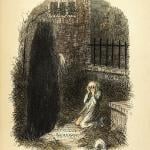Readings: Psalm 22; Luke 23:26-56; Arcana Coelestia 1812
“Father, forgive them, for they know not what they do.” (Luke 23:34)
Imagine. The Lord was being nailed to a cross, His flesh pierced by nails. He had done nothing wrong. He had never acted out of anything other than a desire to save people, to offer them the gift of eternal life. In return, He had been spat on and beaten and mocked. But on being crucified, He said, “Father, forgive them, for they know not what they do.” He had the power to call down fire from heaven to consume them; He could have easily come down from the cross; He could have condemned them eternally to hell. But He did not. He only said, “Father, forgive them, for they know not what they do.”
What was the Lord going through at that point? The account we read in Luke does not give us all the answers, but from other gospels we see signs that on the cross, the Lord was in great torment. In Matthew and Mark, it is recorded that He cried out, “My God, my God, why have You forsaken Me?” Those words echo Psalm 22, which we read this evening. It is a psalm of desolation – “My power is dried up as a potsherd; and my tongue cleaves to my jaws; and You have set me on the dust of death.” (Psalm 22:15) On the cross, the Lord was experiencing intense temptation, pain, and almost complete despair, far beyond anything you or I have ever experienced. It was worse than the worst physical pain you’ve ever felt, worse than the worst emotional pain. And in that pain, the Lord said, “Father, forgive them, for they know not what they do.”
How could the Lord forgive even in that pain? Before we answer that, we also must ask: What was the source of that pain? The physical pain of the cross would have been excruciating – but many people have been crucified and died painful deaths. Would that be enough to compel the Lord Himself to feel abandoned by His Father, to feel separate from the Divine within Himself? It would not. There were many, many more things going on within Him. The Lord was experiencing temptation: combat against hell almost to the point of despair.
This is what was happening at the cross: the final and most painful temptation the Lord would undergo. But those temptations on the cross were not the only ones the Lord endured. From the time of His childhood, He underwent temptation by every part of hell. And the reason that He experienced those temptations His entire life was that from his childhood, in His soul He was love – and a temptation is an assault on someone’s love.
What does that mean, that a temptation is an assault on a love? Well, say a person loves the ideal of honesty. He strives for honesty in his life, and deep inside, he loves it. But that love is attacked whenever evil spirits stir up in him a desire to lie. The deeper part of him does not want that, and is under attack from that lower craving. Along with that desire to lie can come a hopelessness: “I’ll never be truly honest.” If the person did not love honesty, he wouldn’t experience temptation – he would not feel any pain over a desire to lie. A person only experiences a temptation because there is something good that they love, and evil spirits are trying to pervert and kill that love.
The Lord’s love was a love for the entire human race. It was a burning, pressing desire that everyone be freed from slavery to sin, to come into a heavenly freedom of love for one another. It was desire that everyone be given life – Jesus said, “I have come that they may have life, and that they may have it more abundantly” (John 10:10). The Lord in His heart had infinite love, infinite mercy. And so you can imagine how much the spirits of hell hated Him. You can imagine the force with which they would try to attack Him. This was their chance to destroy God, to destroy love itself. And so like wolves to red meat, they swarmed the Lord. For His whole life, the forces of hell attacked Him. That was the source of His temptations.
What was that temptation like? Those evil spirits were trying to destroy the Lord’s love for humanity, and they attacked Him in a thousand devious and hidden ways. Although the Lord had no actual sin, he inherited from his mother a tendency toward sin. And those evil spirits attacked Him through the inclinations toward evil that He had inherited from His mother. They poured into His lower self with their own feelings and thoughts of hatred, and made Him feel as if these were really a part of Him. They poured in thoughts of hopelessness and despair. They projected images of how easy it would have been to force everyone to believe – and in the end, at the crucifixion, to come down from the cross. Even the people present at the crucifixion were joining in the chorus of hellish voices: “He saved others; let Him save Himself, if He be the Christ the chosen of God.” (Luke 23:35).
At least a part of that last temptation must have consisted in an aching desire to come down from the cross, to immediately in their presence prove that He was God. And not for His own sake, but for theirs. Because they did not know what they were doing. If He could show them – you are destroying your own souls! How much of His pain on the cross was this torment and grief for the sake of those very people who were nailing Him to that cross? And you can see here how the evil spirits work – they would take that good and pure love in the Lord and try to twist it, to try to make the Lord act from fear and despair over anyone accepting His love, to convince Him that His only hope lay in forcing people to believe – when in reality to do so would take away their freedom, destroying the very thing that made them human and capable of being joined to Him in love.
The Lord’s love was greater than anyone else’s ever – it was an infinite love. And so the temptations, the attacks on it, were more grievous by far than any temptations experienced by anyone else. The despair felt at the idea that His mission might fail – that the human race would not be redeemed – was a deeper despair than anyone else could have ever experienced or endured.
And yet the Lord endured it. The Lord chose to come into the world, to take on human flesh, knowing full well the pain that He would endure. He knew He would be put to death. And He knew that He would have to put to death parts of Himself – everything with the smallest inclination toward selfishness, every particle that tended toward evil and falsity. And it would be like dying – not just once, but every day of His life. He told His disciples, “If anyone desires to come after Me, let him deny himself, and take up his cross daily, and follow Me.” (Luke 9:23) To live as He did, His disciples would have to take up their cross not once, but daily. Because that’s what He was doing. Every day, He was laying down His life – His own wants – for His friends.
And despite the attacks from hell, the temptations and the despair, the Lord knew He must succeed. Because as powerful as hell was and is, the Lord’s love is infinitely more powerful. And it was from this infinite love that He always fought. We read in Arcana Coelestia,
But in all His combats of temptations the Lord never fought from the love of self, or for Himself, but for all in the universe, consequently, not that He might become the greatest in heaven, for this is contrary to the Divine Love, and scarcely even that He might be the least; but only that all others might become something, and be saved. (AC 1812)
And so even on the cross, love was winning. Would He take revenge, lash out even a little? No. No words of hatred, but “Father forgive them, for they know not what they do.” Those are words of defiance, a battle cry against the forces of hell. No! Even now, even at this, I will not hate. I will put hatred to death. Forgiveness will win. Love will win.
We read the words of the 22nd Psalm, beginning with, “My God, my God, why have you forsaken me?” The Lord cried out with those words, showing that this psalm spoke of His own thoughts on the cross. But the psalm does not end with despair. And the psalm does not end only with hope for the psalmist. The second half of the psalm promises hope for the world: “They shall remember and return unto Jehovah, all the ends of the earth; and all the families of the nations shall worship before Thy face” (Psalm 22:27) And the Lord’s hope and comfort was not that He Himself would be saved, but that the world would be redeemed. That people would be free to choose His love. And that many, many people would choose that love.
And that comfort sustained Him. On the cross, it seemed as if He had lost. It seemed to His disciples as if evil had succeeded in defeating justice. It seemed that hatred and force had triumphed over love. Maybe hell thought it had won. But it was wrong. They had not destroyed love. It was not love that had been nailed to the cross. Jesus had offered up everything that was merely human, everything that had inherited a tendency toward sin – but it was not simply dying. Jesus was not destroying the physical world, or His physical body. He was destroying everything that was merely human in Himself – but He was replacing it with something else. He was making His human divine, even down to the level of his flesh and bones. He was truly and fully becoming incarnate – the Word of God made flesh. And the story of Good Friday is only a prelude to the greatest miracle of all time – the Lord rose again with His whole body, completely Divine, and completely human.
The Lord laid down His life for His friends. He laid down His life for you and me. He laid down His life so that He could take it up again, and draw all people to Himself. And in defeating hell in His flesh, and becoming Divine on every level of creation, He gained power over hell to eternity. And if the Lord underwent that for us – how can we then turn our backs on Him? If He wept and suffered from pure love, so that we could be saved, wanting nothing for Himself – how can we reject that salvation? It matters. There are times when we hold our own lives cheaply – but the Lord never does. His love is great enough that He would undergo all of those things even if it would save only one person.
He underwent those temptations that He could be present in our spirits, and fight against hell for each one of us. We have no power against hell. We are slaves to sin. But He can save us. How does He save us? By defeating hell with us, and giving us a new spirit. And we allow Him to give us that new spirit by acting in love and obedience to Him. We too must take up our cross daily and follow Him. We have to act as if from ourselves to fight against sin, so that He can replace our selfishness with love. And in doing this, we always have to look to Him, praying for His help, acknowledging that despite the appearance, it is truly He alone who is fighting for us, not we ourselves. And if we want to be conformed to His image, we must strive to fight not from a desire to be great, but from a desire to become servants. We too must fight with all our hearts to say of everyone who has hurt us: “Father forgive them, for they know not what they do.” And if we do this, if every day we take up our cross and follow Him – willingly putting to death our own sinful desires – then in Him, we can die to sin, and in Him, we will be raised to life – not the fleshly, temporary life of self-love, but the eternal life of His love – a love for the entire human race, and a love for the source of that love, our Lord Jesus Christ, the One God and Saviour of heaven and earth. Amen.











